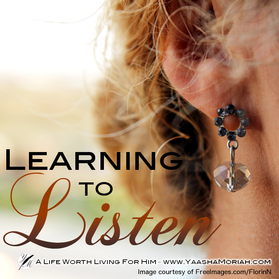 When I was little, talking—not listening—was not my specialty, and I often got myself into trouble. I am not unique. We live in a world of talkers. Every conference, radio station, and social media site confirms the prevalence of talking. We all want to affirm our importance. When I was training to work at a crisis pregnancy center, I learned that our importance as client advocates lay in doing the exact opposite of the rest of the world. We were trained to listen. People are, by nature, very bad listeners. For example, when Jill asks Ashley, “So how did your finals go?” she expects to listen for a minute about Ashley’s experience with finals, but she has actually introduced the topic because she wants to tell about her experience. Jill does not really want to listen. She wants to talk. I discovered my own failures time and time again as I learned to listen to my clients, and then to bring my new listening strategies into my interactions with others. Here is what I learned. 1. Listening is active. You can’t just sit back and chill. You must interact, even subtly. Your body language and eye contact tell the speaker that you are engaged in her topic. If you are sitting across from someone, square your shoulders toward the speaker, keep your posture relaxed, and respond. 2. Listening is patient. Listen to the entire account before you make a judgment. Then, repeat back what you’ve heard. “So what I hear you saying is such-and-such. Am I interpreting that correctly?” Proverbs 18:13 3. Listening is in the moment. A common trap is to consider your response before the speaker has finished talking. Remain in the moment and do not leap ahead mentally. Give the speaker the respect of truly hearing what he has said. 4. Listening is objective. Do not listen for what you want to hear, or even what you expect to hear. Listen to what is said. Your impression is interpretive, but what is actually spoken is important. Consider the words, not your sense of the words. 5. Listening is responsive. If someone speaks to me about my behavior, I may adhere to all of the above rules, but until I act on what I have heard, have I truly listened? No. Above all, listening requires a response, whether it is my defense of my behavior or my active change of my behavior. What good is it, to hear and to do nothing? James 1:22 The listener has a unique advantage over the talker. Namely, the talker must justify why she is worth listening to. The listener, on the other hand, has already given a reason. When we feel that we have been listened to, we are willing to hear what the listener has to say.
0 Comments
Leave a Reply. |
Meet YaashaNone of my life has gone the way it was "supposed to go," but I don't love my life any less because of the hardships and new directions. I see so much unexpected good in it, and I want others to see the good in theirs. Archives
May 2020
Categories
All
|

